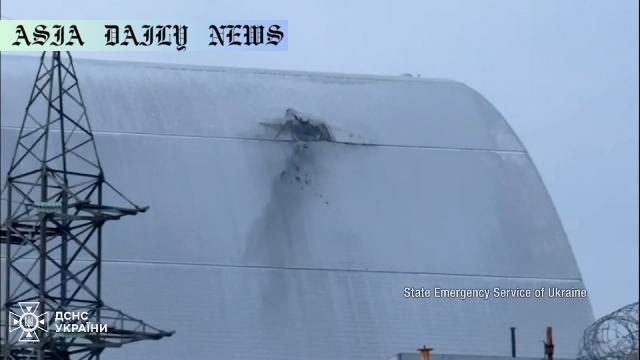Chernobyl: Zelenskyy revealed that a Russian drone strike damaged the shelter protecting the 4th reactor, but radiation levels remain stable.
A Russian drone targeted the Chernobyl nuclear plant, hitting the shelter of the 4th reactor.
President Zelenskyy confirmed damage but assured that radiation levels remain under control.
A fire caused by the attack was extinguished promptly.

Introduction: The Attack on Chernobyl
The Chernobyl Nuclear Power Plant, infamous for the 1986 disaster, recently came under attack due to ongoing geopolitical tensions. Ukrainian President Volodymyr Zelenskyy disclosed that a Russian drone strike targeted and damaged the protective shelter covering the destroyed 4th reactor. Luckily, radiation levels, critical to the safety of the surrounding regions and beyond, remain stable following the incident.
Details of the Strike
On Friday, Zelenskyy took to social media to share the news of the attack. The drone reportedly caused significant damage to the specially constructed shelter designed to contain residual radiation from the catastrophic explosion decades ago. This structure, often referred to as the ‘sarcophagus,’ was built to isolate radioactive contaminants that are still being monitored closely by authorities.
Immediate Aftermath
Following the attack, Ukrainian emergency services acted quickly to extinguish a fire sparked by the strike. Thankfully, early assessments indicated that there has been no detectable increase in radiation levels in the area. Keeping radiation under control is of utmost importance to avoid any potential fallout threats that could affect not only Ukraine but also neighboring countries and beyond.
Global Implications of the Attack
Attacks on a globally sensitive site like Chernobyl carry deep implications. The international community has long viewed Chernobyl as a potent symbol of the dangers of nuclear disasters, making direct strikes on this site a matter of international concern and condemnation.
Ukraine’s Resilience Amid Challenges
This drone attack serves as another testament to Ukraine’s struggle amid ongoing conflict. Despite such provocations, Ukrainian officials have ensured public safety by taking rapid preventative measures and keeping the region stabilized after the attack.
Future Preparedness
This incident underscores the need for international bodies to step up measures safeguarding nuclear sites in conflict zones. As sensitive installations like Chernobyl serve as critical points of interest, ensuring they remain unharmed should be a global priority.
Conclusion
The attack on the Chernobyl Nuclear Power Plant highlights the precarious nature of international conflicts and their potential risks to human safety. While immediate danger was avoided this time, the global community must not take such events lightly. Proactive measures to protect nuclear sites and hold responsible parties accountable are paramount to preventing future disasters.
Commentary
The Gravity of Targeting Chernobyl
The news of a Russian drone strike on the Chernobyl Nuclear Power Plant is both alarming and perplexing. Chernobyl, a site synonymous with one of the worst nuclear disasters in history, remains a symbol of human error and the harrowing consequences of radiation exposure. Targeting such a sensitive location reflects a disregard for both international norms and human safety.
Ukrainian Resilience in Action
President Zelenskyy and Ukrainian authorities deserve credit for their swift efforts to mitigate any immediate dangers posed by the attack. The quick containment of the fire and prompt communication with international audiences display a level of governance that prioritizes transparency and public welfare.
A Call for Global Accountability
The Chernobyl incident underscores the urgent need for international organizations to step up interventions in armed conflicts. Nuclear sites, given their sensitive and catastrophic potential, should be off-limits in warfare. It is essential that global leaders advocate for stricter enforcement of protections for these locations to discourage such reckless acts in the future.


